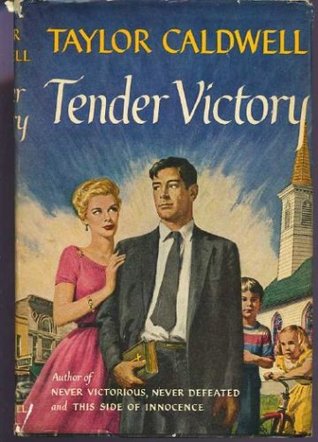"Young Johnny Fletcher arrives in Barryfield to take up his new ministry after the war, bringing with him a group of five orphaned refugee children whom he adopted while an Army chaplain in Europe in the hope of winning them back to a meaningful life by understanding and love."
Set right after World War II. Set in a small town. About a father's love helping to "heal" the broken lives of his adopted children. And he's a minister. It has to be good, right?! Wrong!
© Becky Laney of Operation Actually Read Bible
I'm trying to discern if my problem with the book is literary or theological--or both. Is this merely a case of bad writing technique? Or is the horrific theology setting off all my radars and making it impossible to enjoy. At this point, if I'm honest, the only thing that would redeem the book for me is if Johnny Fletcher saw the light, got down on his knees and repented of his pride in rewriting the Bible and preaching the gospel as he saw fit. I don't think it's likely. I only have about seventy-five pages to go.
Literary issues. The book is not character-driven. It is not plot-driven. It is not even premise-driven. It is driven by ideas or anti-ideas. The book is just as much about what it is FOR as what it is AGAINST. The characters do not exist in their own right but exist merely for being the voices of various ideological ideas or positions. Which leads to the problem I have with the dialogue. I feel like the dialogue is essentially a tool, a hammer. Every single page, the dialogue is hammering something. Every single time a character opens his or her mouth, it's to hammer down an idea for the readers. The dialogue doesn't come across as natural because every word is an opportunity to preach a message.
Content issues. This book about a minister has a lot of curse words, which may or may not be offensive to the average reader. (Depending on the word and how often it is used--that is my standard.) This one has blasphemy. If the characters weren't supposed to be Christian, if so much of this one didn't take place in the church or in the church parsonage, if this was your typical, modern book--I wouldn't be surprised or taken aback by that.
Theological issues. So the main point of this book seems to be singing the praises of tolerance. All religions lead to the same God; there are many roads, many paths, many ways to finding God. No matter what name you call him, God is God. The content of what you believe doesn't matter so long as you're sincere. One religion is not "better" than the other. One is not "more true" or "less true." Even when the religions disagree with each other unmistakably--they all lead to God in the end, and all is well. It's best to let people come to their own knowledge and understand of who God is. He's there to inspire love and kindness here on earth. If John Lennon's Imagine had been a single, I bet Johnny Fletcher would have gone around singing it day and night, night day.
There are rare moments when Fletcher says something I agree with. A broken clock, a stopped clock, is right at least twice a day.
I believe that readers should be discerning with what they read, aware that every book has a worldview embedded in it. This worldview is toxic, though not unique.


1 comment:
I totally agree!
Post a Comment